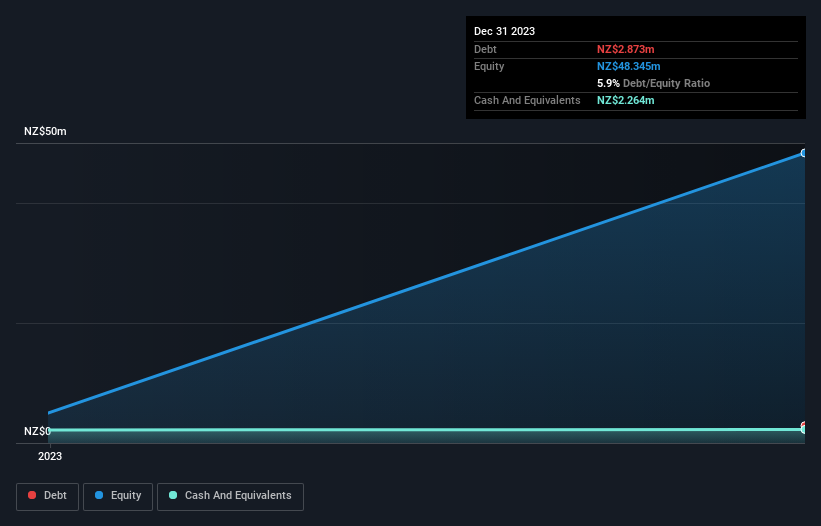
The external fund manager backed by Berkshire Hathaway's Charlie Munger, Li Lu, makes no bones about it when he says 'The biggest investment risk is not the volatility of prices, but whether you will suffer a permanent loss of capital.' It's only natural to consider a company's balance sheet when you examine how risky it is, since debt is often involved when a business collapses. As with many other companies Cannasouth Limited (NZSE:CBD) makes use of debt. But the real question is whether this debt is making the company risky.
When Is Debt Dangerous?
Generally speaking, debt only becomes a real problem when a company can't easily pay it off, either by raising capital or with its own cash flow. If things get really bad, the lenders can take control of the business. However, a more frequent (but still costly) occurrence is where a company must issue shares at bargain-basement prices, permanently diluting shareholders, just to shore up its balance sheet. By replacing dilution, though, debt can be an extremely good tool for businesses that need capital to invest in growth at high rates of return. The first step when considering a company's debt levels is to consider its cash and debt together.
Check out our latest analysis for Cannasouth
What Is Cannasouth's Debt?
The image below, which you can click on for greater detail, shows that at December 2023 Cannasouth had debt of NZ$2.87m, up from none in one year. However, it does have NZ$2.26m in cash offsetting this, leading to net debt of about NZ$609.1k.

How Healthy Is Cannasouth's Balance Sheet?
We can see from the most recent balance sheet that Cannasouth had liabilities of NZ$2.73m falling due within a year, and liabilities of NZ$4.38m due beyond that. On the other hand, it had cash of NZ$2.26m and NZ$496.2k worth of receivables due within a year. So its liabilities total NZ$4.35m more than the combination of its cash and short-term receivables.
Of course, Cannasouth has a market capitalization of NZ$34.0m, so these liabilities are probably manageable. However, we do think it is worth keeping an eye on its balance sheet strength, as it may change over time. When analysing debt levels, the balance sheet is the obvious place to start. But it is Cannasouth's earnings that will influence how the balance sheet holds up in the future. So if you're keen to discover more about its earnings, it might be worth checking out this graph of its long term earnings trend.
In the last year Cannasouth wasn't profitable at an EBIT level, but managed to grow its revenue by 11,333%, to NZ$956k. That's virtually the hole-in-one of revenue growth!
Caveat Emptor
While we can certainly appreciate Cannasouth's revenue growth, its earnings before interest and tax (EBIT) loss is not ideal. Its EBIT loss was a whopping NZ$8.7m. When we look at that and recall the liabilities on its balance sheet, relative to cash, it seems unwise to us for the company to have any debt. So we think its balance sheet is a little strained, though not beyond repair. Another cause for caution is that is bled NZ$9.3m in negative free cash flow over the last twelve months. So in short it's a really risky stock. When analysing debt levels, the balance sheet is the obvious place to start. But ultimately, every company can contain risks that exist outside of the balance sheet. Case in point: We've spotted 5 warning signs for Cannasouth you should be aware of, and 3 of them shouldn't be ignored.
If you're interested in investing in businesses that can grow profits without the burden of debt, then check out this free list of growing businesses that have net cash on the balance sheet.
New: AI Stock Screener & Alerts
Our new AI Stock Screener scans the market every day to uncover opportunities.
• Dividend Powerhouses (3%+ Yield)
• Undervalued Small Caps with Insider Buying
• High growth Tech and AI Companies
Or build your own from over 50 metrics.
Have feedback on this article? Concerned about the content? Get in touch with us directly. Alternatively, email editorial-team (at) simplywallst.com.
This article by Simply Wall St is general in nature. We provide commentary based on historical data and analyst forecasts only using an unbiased methodology and our articles are not intended to be financial advice. It does not constitute a recommendation to buy or sell any stock, and does not take account of your objectives, or your financial situation. We aim to bring you long-term focused analysis driven by fundamental data. Note that our analysis may not factor in the latest price-sensitive company announcements or qualitative material. Simply Wall St has no position in any stocks mentioned.
About NZSE:CBD
Cannasouth
A medicinal cannabis company, engages in the manufacture of cannabis-based ingredients and oral solutions.
Mediocre balance sheet with weak fundamentals.
Market Insights
Community Narratives


